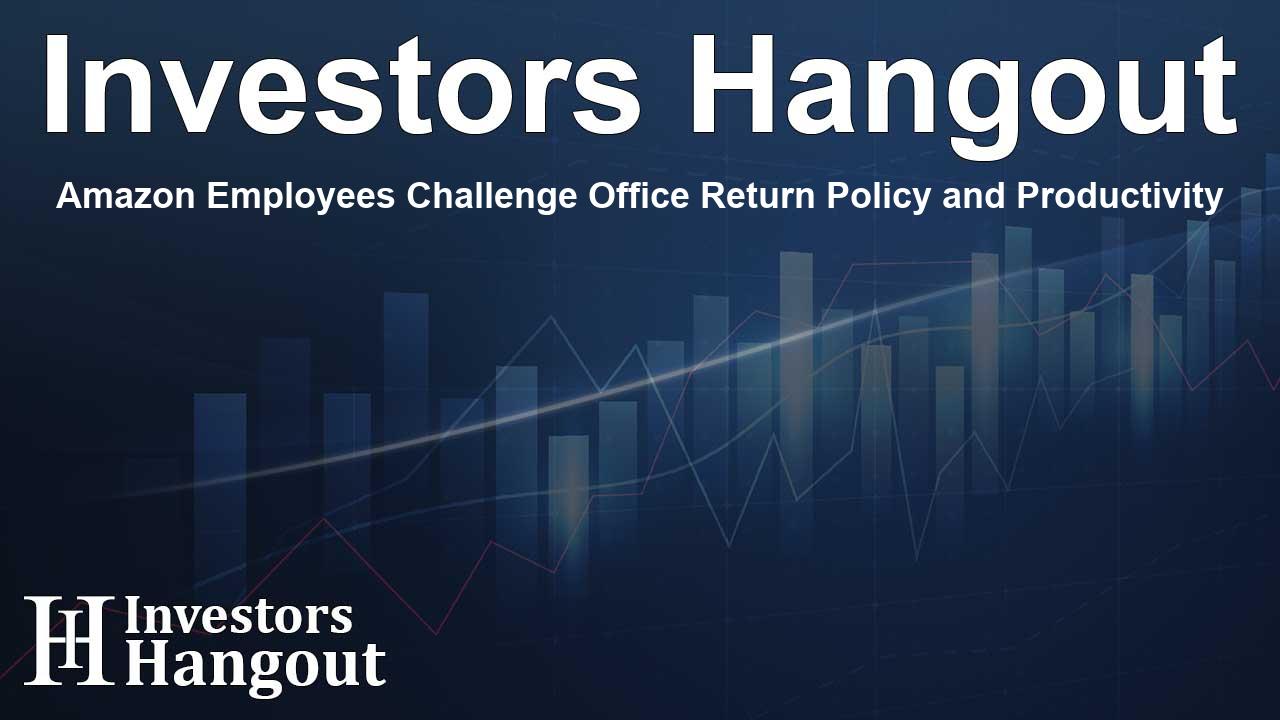Amazon Employees Challenge Office Return Policy and Productivity

Amazon Employees Voice Concerns Over Return-to-Office Mandate
Recently, there has been significant pushback from Amazon employees regarding a new requirement to return to the office five days a week. This policy, initiated by CEO Andy Jassy, has stirred discontent among workers who are worried about how this change will swiftly affect their lives and overall productivity. The call for a more flexible working structure has never been louder, reflecting a notable shift in workplace norms.
Employee Feedback and Survey Insights
An anonymous survey circulated among corporate employees has revealed that discontent runs deep. The survey, gaining traction via the messaging app Slack, highlighted significant dissatisfaction. As of late September, participants rated their satisfaction with the return-to-office (RTO) policy at a mere 1.4 out of 5, where 1 represents "strongly dissatisfied" and 5 indicates "strongly satisfied." The survey's creators intend to convey these insights directly to Jassy and leadership, hoping to address employee concerns effectively.
The Impact of Office Mandates on Employee Morale
Many Amazon workers feel the company's decision undermines their previous experiences of hybrid or remote work. Past approaches allowed for greater flexibility, which they argue fostered better collaboration and boosted productivity. But the return to full office days threatens this balance, especially for those managing personal responsibilities like childcare. Employees cite not just a loss of flexibility but also a growing distrust in leadership’s decision-making process.
Concerns From Diverse Employee Perspectives
The mix of opinions among workers is striking. While some applaud Jassy's move, believing that working in the office promotes unity and collaboration, a greater number fear that this shift may lead to higher employee turnover. Enhanced collaborations and problem-solving appear strained through the rigid structure of a five-day in-office policy.
Challenges in Communication and Collaboration
A key criticism centers around the challenges of collaborating across different time zones when limited by an in-office schedule. Employees often feel pressured to adjust their hours, which complicates communication. A respondent pointed out that the new RTO policy hampers their ability to contribute effectively, especially when engaged with teams spread across various regions.
Leadership's Response And Future Outlook
In his communication, Jassy emphasized the perceived benefits of in-person collaboration, citing improved learning, culture-building, and teamwork effectiveness. Yet, many employees view this rationale as insufficient, asking for more substantial justification behind the policy change. Their lack of trust in leadership's motives fuels anxiety around potential repercussions for not conforming to the new standard.
Navigating the Work-Life Balance
For Amazon corporate employees, the return to a five-day office presence signifies a drastic transformation in their work-life balance. Many express concern about the loss of flexibility, which had come to signify their work environment during remote working phases. The struggle to manage personal and professional responsibilities intensifies, particularly for those with family commitments.
Long-term Effects of the Policy Shift
Going forward, it’s likely that this conflict over the return-to-office mandate will lead to significant shifts within Amazon’s workforce. The strong opinions voiced by employees underscore the risk of losing talent who are increasingly seeking roles that provide greater flexibility. Research indicates that workplaces with accommodating policies often attract and retain the best talent.
Conclusion: The Road Ahead for Amazon
As the company maneuvers through this tumultuous period, leaders may face critical decisions regarding the long-term structure of their workforce. Acknowledging employee sentiments and fostering a culture of trust could prove vital in navigating the challenges ahead. The results of this survey and ongoing employee feedback may serve as crucial indicators of Amazon's workplace culture and its ability to adapt in the future.
Frequently Asked Questions
What prompted Amazon to implement this return-to-office mandate?
The return-to-office mandate was initiated by CEO Andy Jassy as a shift back to traditional in-office working. Jassy believes that being physically together fosters a stronger work culture.
How have employees reacted to the policy change?
Many employees have expressed dissatisfaction, with survey results indicating a low satisfaction rating regarding the return-to-office requirement.
What are the main concerns of Amazon employees?
Employees are primarily concerned about the impact on productivity, work-life balance, and the feeling of distrust in leadership’s decision-making.
What potential consequences could arise from this policy change?
There is a risk of increased employee turnover as workers might seek opportunities that offer more flexibility and better accommodate their personal responsibilities.
How has management responded to employee concerns?
While management has acknowledged the feedback, it has yet to provide substantial changes or reassurances that address employees' frustrations over the return-to-office decision.
About The Author
Contact Riley Hayes privately here. Or send an email with ATTN: Riley Hayes as the subject to contact@investorshangout.com.
About Investors Hangout
Investors Hangout is a leading online stock forum for financial discussion and learning, offering a wide range of free tools and resources. It draws in traders of all levels, who exchange market knowledge, investigate trading tactics, and keep an eye on industry developments in real time. Featuring financial articles, stock message boards, quotes, charts, company profiles, and live news updates. Through cooperative learning and a wealth of informational resources, it helps users from novices creating their first portfolios to experts honing their techniques. Join Investors Hangout today: https://investorshangout.com/
The content of this article is based on factual, publicly available information and does not represent legal, financial, or investment advice. Investors Hangout does not offer financial advice, and the author is not a licensed financial advisor. Consult a qualified advisor before making any financial or investment decisions based on this article. This article should not be considered advice to purchase, sell, or hold any securities or other investments. If any of the material provided here is inaccurate, please contact us for corrections.
